Legionella Testing & Monitoring
Get Legionella compliant, we will provide you with monitoring plans to prevent legionella risks that suit your needs and exact requirements
Choosing the Right Legionella Testing & Monitoring Solution for Your Facility
When it comes to Legionella control, Techright Environmental is the expert. Our primary objective is to reduce the risk of Legionella in your hot and cold water systems. We recognise that each facility is different, which is why we provide customised Legionella testing and monitoring solutions that are tailored to meet your specific requirements.
Our services include:
- total service solutions
- training sessions for your staff
- compliance audits
- provision of monitoring and recording logbooks
Furthermore, should there be any issues with temperatures or sample results that do not meet compliance standards, we are here to help you. Our team will work with you to ensure that your site is brought back to a safe and compliant standard. You can trust us to assist you with all aspects of Legionella compliance.
The Key Components of Successful Legionella Testing & Monitoring Plans
Undoubtedly, to ensure a successful Legionella control and prevention plan, it is crucial to have a well-designed monitoring plan in place. Prevention is the key focus, as it involves identifying and eliminating the factors that promote the growth and multiplication of Legionella bacteria. By implementing a comprehensive monitoring plan, you can proactively maintain the safety and cleanliness of your water system. This proactive approach is far more effective than reactive measures taken after an outbreak occurs. Therefore, it is essential to establish a strong and reliable monitoring plan to safeguard the health and integrity of your water system. Some key components of successful Legionella testing and monitoring plans include:
Monitoring of Hot and Cold Water in Legionella Control
To prevent the growth of Legionella bacteria, it is important to monitor the temperature of both hot and cold water in your water system. Our services include ensuring that the:
- Hot water is stored at 60°C
- Hot water is distributed to reach 50°C (55°C healthcare) at an outlet within 1 minute
- Cold water is less than 20°C By maintaining these temperature controls, you can help prevent the spread of Legionella and ensure the safety of your water system.
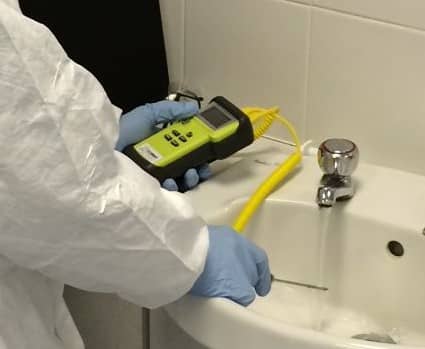
Record Keeping for Legionella Testing & Monitoring
It is equally important to have a computerised database to show all your temperatures detailing passes and fails allowing you to take quick preventive action. According to the HSE guidelines, records must be retained for the period they remain current and for at least two years afterwards, with the exception of records kept for monitoring and inspection, which should be kept for at least five years. Our system will provide you with the necessary tools to efficiently manage and store these records, ensuring accountability and facilitating effective decision-making. We will provide you with a web-based electronic monitoring database system that will:
- store your PDF legionella risk assessment
- store your microbiological test results
- store your water tank chlorination certificates
- store your risk assessment and method statements
- store your completion reports
- centralise all your documents for audits
- keep records of all your temperatures

The Importance of Cold Water Storage Tank Inspections for Legionella Monitoring
To prevent the risk of Legionella, it is important to follow the guideline provided by the HSE. This includes annual inspections of Cold Water storage tanks and conducting any necessary remedial work. By doing so, you can effectively reduce the risk of Legionella contamination. Our services encompass these inspections and remedial actions to ensure the safety of your water storage systems. We will:
- check both the inside and outside of the tank and water stored within it
- check the tank for a secure tightly fitted tank lid with air breather
- check for insulation on the tank to avoid heat gain & loss
- check for ingress screen
- check your inlet and outlet connections are on the opposite to allow good cross flow
- check the temperature of the tank is stored below 20°C
- check the overall condition of the tank
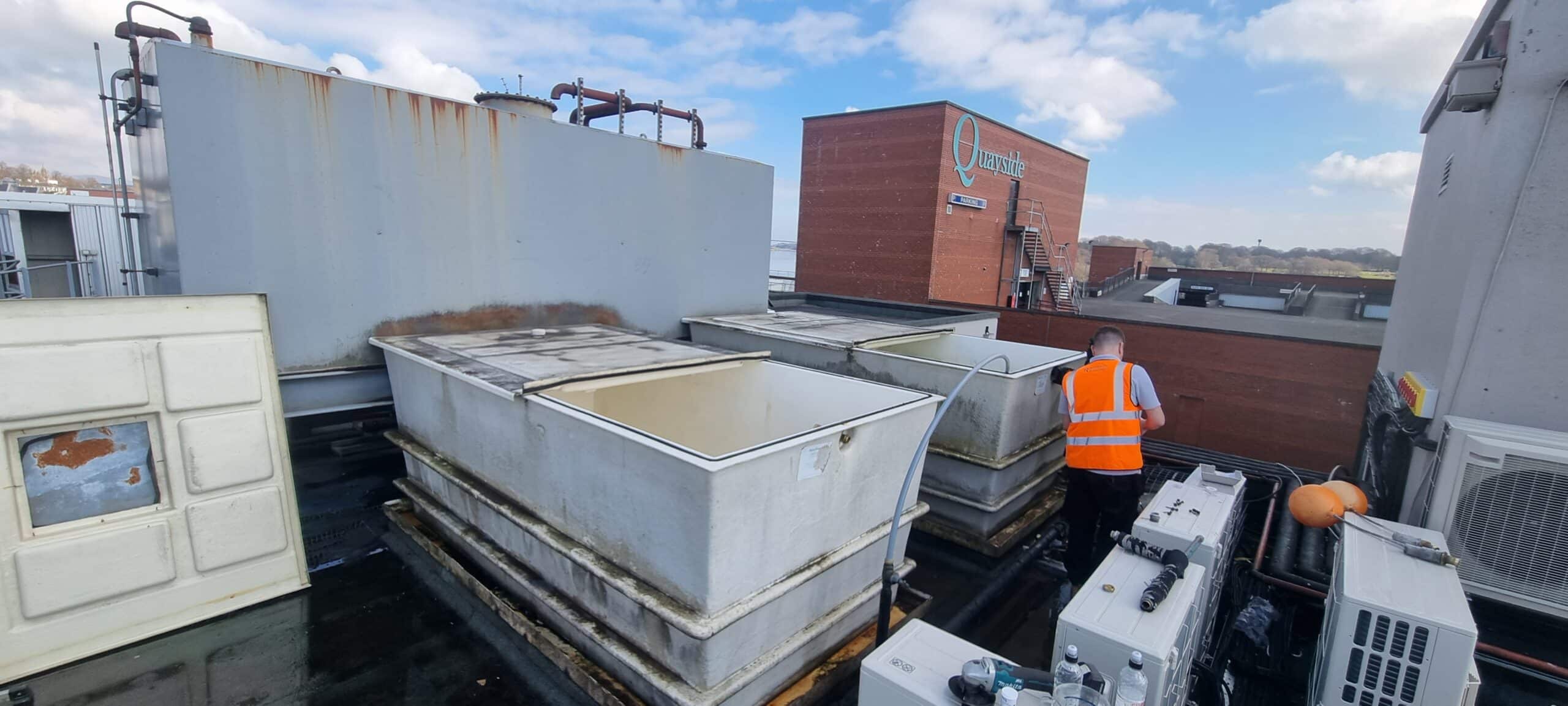
The Importance of Hot Water Systems Inspections for Legionella Monitoring
Monitoring and maintaining hot water systems is crucial to prevent the growth of Legionella bacteria. Calorifiers, in particular, can be a potential breeding ground for Legionella. To ensure their proper functioning, it is important to regularly inspect and clean them according to guidelines provided by the Health and Safety Executive (HSE). Internal inspections can be done by removing the inspection hatch or using a boroscope, and cleaning should be done by draining the vessel. These inspections and cleanings should be conducted annually. Additionally, the flow temperature of the Calorifier should be monitored monthly. Our services offer assistance in these areas to help ensure the safety and efficiency of your hot water systems:
- check the flow and return temperatures as outgoing should be a minimum of 60°C in order to kill legionella bacteria with a return of 50°C
- carry out calorifier blowdowns to reduce sediment build-up which can produce a suitable environment for bacteria and reduce efficiency
- check the pipework is insulated to prevent heat loss
- check the calorifier internals using a borescope and clean as required, followed by chlorination or a thermal pasteurisation

The Importance of Shower Head Cleaning for Legionella Monitoring
Shower head cleaning is crucial for Legionella monitoring and preventing the spread of Legionnaires’ disease. When you take a shower, the water creates a fine mist or aerosol, and if the water is contaminated with Legionella bacteria, it can be inhaled into the lungs. This can lead to the proliferation of the bacteria and the development of Legionnaires’ disease.
To ensure a safe and clean showering experience, it is important to regularly clean, descale, and flush showerheads. These measures help remove any potential bacteria and reduce the risk of Legionella contamination. By maintaining proper hygiene and cleaning practices, we can minimise the chances of contracting Legionnaires’ disease from a shower. For more information on shower head cleaning for Legionella, please refer to our informative resources.
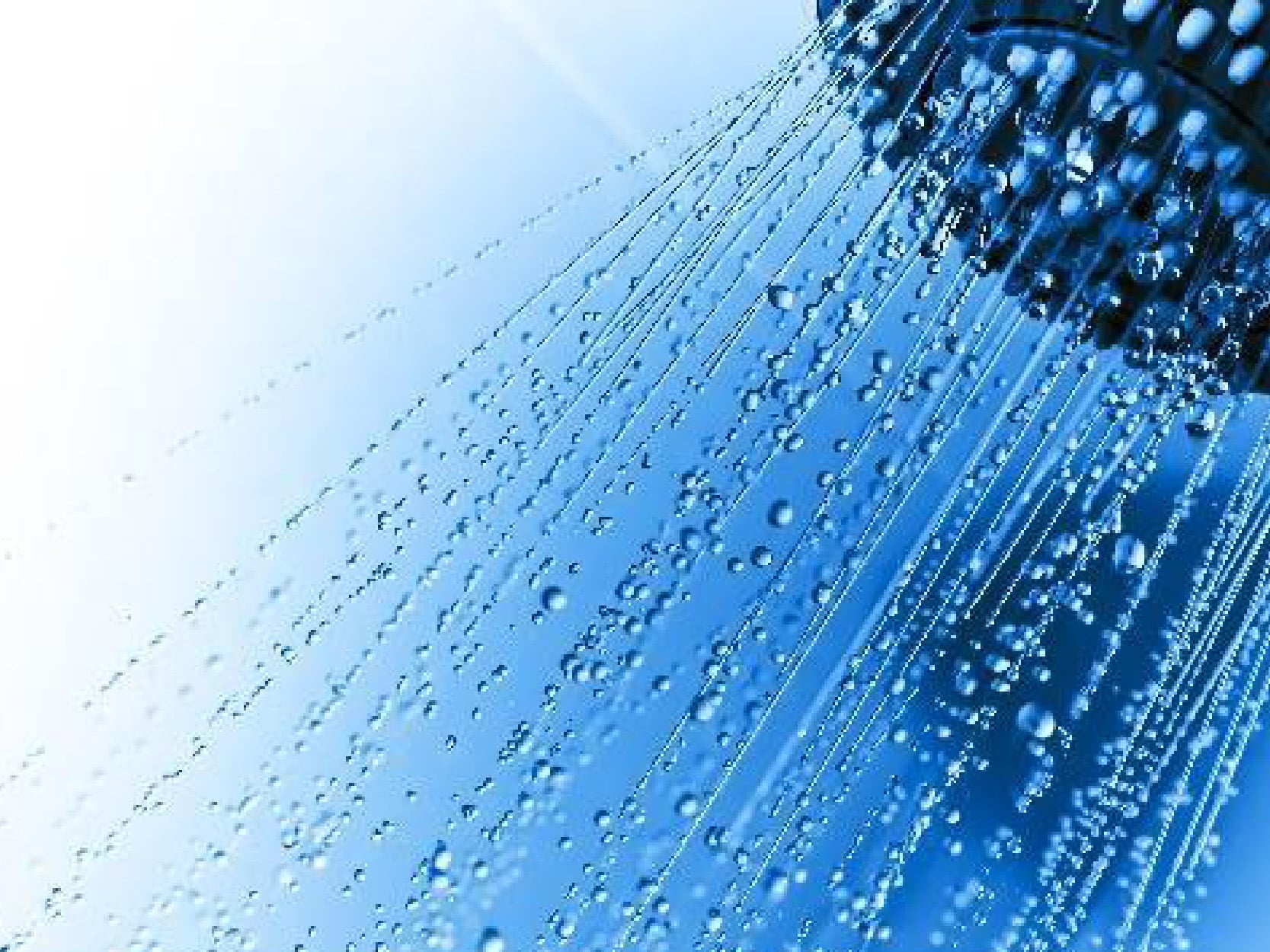
Descaling and chlorination of all water outlets
To ensure the prevention of Legionella bacteria growth, it is important to regularly descale water equipment. Limescale build-up creates an optimal breeding ground for these bacteria. Our comprehensive range of services includes the thorough removal of limescale, as well as the cleaning and flushing of various water equipment such as:
- taps
- shower heads
- hoses
- water boilers
- point of use water heaters
and any other equipment present on your premises
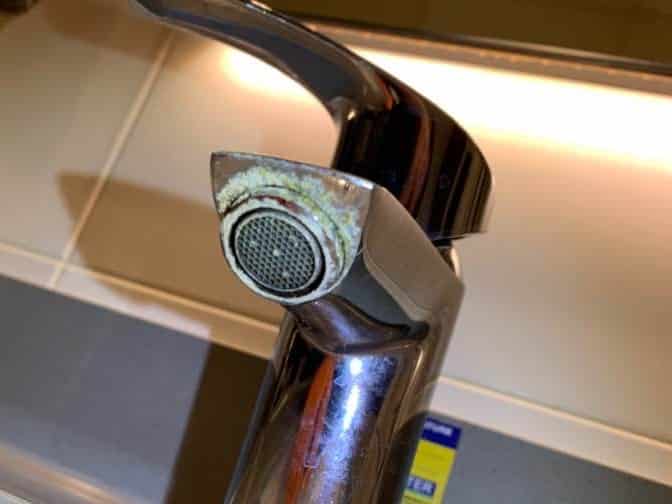
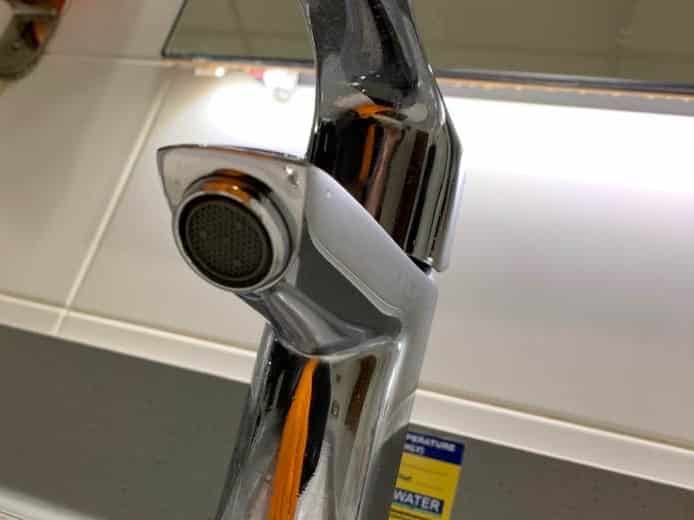
Microbiological Water Sampling for Legionella Testing
If you want to determine whether there are bacteria in your water, the only way to do so is by conducting a water test. This test is crucial in assessing the level of microbiological bacteria in your system, with a specific focus on checking for the presence of Legionella bacteria. To ensure that the results are independent and reliable, all water samples will be analysed at a laboratory accredited by UKAS (United Kingdom Accreditation Service).
We provide two options for your convenience. For small businesses, you can save costs by collecting your own water samples using our legionella testing kit. The kit includes all necessary materials, and you will receive the laboratory test results via email within 10-14 days. Alternatively, our experienced professionals can visit your premises and collect the samples for you.

Legionella monitoring is a crucial aspect of ensuring the safety of your site. Our team of expert consultants are fully trained in the management and control of legionella and will provide practical advice and solutions tailored to your specific needs. The frequency and extent of monitoring will be determined by the findings of our assessment. By taking these steps, you can safeguard your business and reduce the risk of exposure to harmful bacteria such as Legionella. Trust us to help you maintain a safe and healthy environment for your employees and customers.
Conducting Legionella Bacteria Tests: Safeguarding Water Quality
Legionella bacteria tests play a crucial role in assessing the presence of Legionella bacteria in water systems and identifying potential health risks. Legionella, a bacterium found naturally in water environments, can pose significant health hazards if allowed to proliferate in man-made water systems. Conducting regular Legionella bacteria tests is essential for preventing outbreaks of Legionnaires’ disease and ensuring the safety of water supplies.
Key Steps in Legionella Bacteria Testing
Conducting Legionella bacteria tests involves the following key steps:
- Sample Collection: Collecting water samples from various points within water systems, including hot water tanks, cooling towers, and faucets, where Legionella bacteria are likely to be present.
- Laboratory Analysis: Sending collected samples to accredited laboratories for analysis using specialized testing methods, such as culture-based or molecular techniques, to detect the presence of Legionella bacteria.
- Interpretation of Results: Reviewing test results to determine the concentration of Legionella bacteria present in the samples and assessing the risk of contamination based on established guidelines and regulations.
- Action Planning: Developing action plans based on test results to address any identified risks, which may include implementing control measures, conducting remediation activities, or increasing monitoring frequency.
Frequency of Legionella Bacteria Testing
The frequency of Legionella bacteria testing depends on various factors, including the type of water system, its usage patterns, and regulatory requirements. As a general guideline, testing should be conducted at least annually. However, in high-risk environments or following significant changes to water systems, more frequent testing may be necessary to ensure ongoing compliance and safety.
Benefits of Regular Legionella Bacteria Testing
Regular Legionella bacteria testing offers several benefits, including:
- Early Detection of Contamination: Identifying the presence of Legionella bacteria allows for timely intervention and implementation of control measures to prevent potential outbreaks.
- Compliance with Regulations: Conducting regular testing helps ensure compliance with health and safety regulations and guidelines related to Legionella management.
- Protection of Public Health: By proactively monitoring for Legionella bacteria, the likelihood of Legionnaires’ disease outbreaks and associated health risks is minimized, protecting the health and well-being of building occupants and the public.
